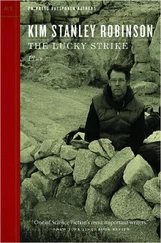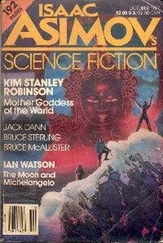That night they celebrate with champagne again, and the party gets wild as they become sillier and sillier. Marie tries to climb the inner wall of the tent by grabbing the soft material in her hands, and falls to the floor repeatedly; Dougal juggles boots; Arthur challenges all comers to arm wrestle, and wins so quickly they decide he is using “a trick,” and disallow his victories; Roger tells government jokes (“How many ministers does it take to pour a cup of coffee?”), and institutes a long and lively game of spoons. He and Eileen play next to each other and in the dive for spoons they land on each other. Afterward, sitting around the heater singing songs, she sits at his side and their legs and shoulders press together. Kid stuff, familiar and comfortable, even to those who can’t remember their own childhoods.
So that, that night, after everyone has gone out to the little sleeping nooks at the perimeter of the tent’s circular floor, Roger’s mind is full of Eileen. He remembers sponging her down that morning. Her playfulness this evening. Climbing in the storm. The long nights together in wall tents. And once again the distant past returns—his stupid, uncontrollable memory provides images from a time so far gone that it shouldn’t matter anymore . . . but it does. It was near the end of that trip too. She sneaked into his little cubicle and jumped him! Even though the thin panels they used to create sleeping rooms were actually much less private than what they have here; this tent is big, the air regulator is loud, the seven beds are well spaced and separated from each other by ribbing—clear ribbing, it is true, but now the tent is dark. The cushioned floor under him (so comfortable that Marie calls it uncomfortable) gives as he moves, without even trembling a few feet away, and it never makes a sound. In short, he could crawl silently over to her bed, and join her as she once joined him, and it would be entirely discreet. Turnabout is fair play, isn’t it? Even three hundred years later? There isn’t much time left on this climb, and as they say, fortune favors the bold. . . .
He is about to move when suddenly Eileen is at his side, shaking his arm. In his ear she says, “I have an idea.”
And afterward, teasing: “Maybe I do remember you.”
They trek higher still, into the zone of rock. No animals, plants, insects; no lichen; no snow. They are above it all, so high on the volcano’s cone that it is getting difficult to see where their escarpment drops to the forests; two hundred kilometers away and fifteen kilometers below, the scarp’s edge can only be distinguished because that’s where the broad ring of snow ends. They wake up one morning and find a cloud layer a few k’s downslope, obscuring the planet below. They stand on the side of an immense conical island in an even greater sea of cloud: the clouds a white wave-furrowed ocean, the volcano a great rust rock, the sky a low dark violet dome, all on a scale the mind can barely encompass. To the east, poking out of the cloud sea, three broad peaks—an archipelago—the three Tharsis volcanoes in their well-spaced line, princes to the king Olympus. Those volcanoes, fifteen hundred kilometers away, give them a little understanding of the vastness visible. . .
The rock up here is smoothly marbled, like a plain of petrified muscles. Individual pebbles and boulders take on an eerie presence, as if they are debris scattered by Olympian gods. Hans’s progress is greatly slowed by his inspection of these rocks. One day, they find a mound that snakes up the mountain like an esker or a Roman road; Hans explains it was a river of lava harder than the surrounding basalt, which has eroded away to reveal it. They use it as an elevated road and hike on it for all of one long day.
Roger picks up his pace, leaves the cart and the others behind. In a suit and helmet, on the lifeless face of Mars: Centuries of memory flood him, he finds his breathing clotted and uneven. This is my country, he thinks. This is the transcendent landscape of my youth. It’s still here. It can’t be destroyed. It will always be here. He finds that he has almost forgotten, not what it looks like, but what it feels like to be in such wilderness. That thought is the thorn in the exhilaration that mounts with every step. Stephan and Eileen, the other two out of harness this day, are following him up. Roger notices them and frowns. I don’t want to talk about it, he thinks. I want to be alone in it.
But Stephan hikes right by him, looking overwhelmed by the desolate rock expanse, the world of rock and sky. Roger can’t help but grin.
And Eileen is content just to walk with him.
Next day, however, in the harness of the cart, Stephan plods beside him and says, “Okay, Roger, I can see why you love this. It is sublime, truly. And in just the way we want the sublime—it’s a pure landscape, a pure place. But. . .” He plods on several more steps, and Roger and Eileen wait for him to continue, pulling in step together. “But there is life on Mars. And it seems to me that you don’t need the whole planet this way. This will always be here. The atmosphere will never rise this high, so you’ll always have this. And the world down below, with all that life growing everywhere—it’s beautiful.” The beautiful and the sublime, Roger thinks. Another duality. “And maybe we need the beautiful more than the sublime?”
They haul on. Eileen looks at the mute Roger. He cannot think what to say. She smiles. “If Mars can change, so can you.”
“The intense concentration of self in the middle of such a heartless immensity, my God! who can tell it?”
That night Roger seeks out Eileen, and makes love to her with a peculiar urgency; and when they are done he finds himself crying a bit, he doesn’t know why; and she holds his head against her breast, until he shifts, and turns, and falls asleep.
And the following afternoon, after climbing all day up a hill that grows ever gentler, that always looks as if it will peak out just over the horizon above them, they reach flattened ground. An hour’s hike, and they reach the caldera wall. They have climbed Olympus Mons.
They look down into the caldera. It is a gigantic brown plain, ringed by the round cliffs of the caldera wall. Smaller ringed cliffs inside the caldera drop to collapse craters, then terrace the round plain with round depressions, which overlap each other. The sky overhead is almost black; they can see stars, and Jupiter. Perhaps the high evening star is Earth. The thick blue rind of the atmosphere actually starts below them, so that they stand on a broad island in the middle of a round blue band, capped by a dome of black sky. Sky, caldera, ringed stone desolation. A million shades of brown, tan, red, rust. The planet Mars.
Along the rim a short distance stands the ruins of a Tibetan Buddhist lamasery. When Roger sees it his jaw drops. It is brown, and the main structure appears to have been a squarish boulder the size of a large house, carved and excavated until it is more air than stone. While it was occupied it must have been hermetically sealed, with airlocks in the doorways and windows fixed in place; now the windows are gone, and side buildings leaning against the main structure are broken-walled, roofless, open to the black sky. A chest-high wall of stone extends away from the outbuildings and along the rim; colored prayer wheels and prayer flags stick up from it on thin poles. Under the light touch of the stratosphere the wheels spin slowly, the flags flap limply.
“No.”
“The caldera is as big as Luxembourg.”
“You’re kidding.”
Finally even Marie is impressed. She walks to the prayer wall, touches a prayer wheel with one hand; looks out at the caldera, and from time to time spins the wheel, absently.
Читать дальше
Конец ознакомительного отрывка
Купить книгу












